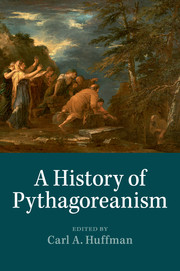Book contents
- Frontmatter
- Contents
- Contributors
- Abbreviations
- Introduction
- Chapter 1 Pythagoras
- Chapter 2 Philolaus
- Chapter 3 Archytas
- Chapter 4 Sixth-, fifth- and fourth-century Pythagoreans
- Chapter 5 The Pythagorean society and politics
- Chapter 6 The Pythagorean way of life and Pythagorean ethics
- Chapter 7 Pythagoreans, Orphism and Greek religion
- Chapter 8 The problem of Pythagorean mathematics
- Chapter 9 Pythagorean harmonics
- Chapter 10 The Pythagoreans and Plato
- Chapter 11 Aristotle on the “so-called Pythagoreans”: from lore to principles
- Chapter 12 Pythagoreanism in the Academic tradition: the Early Academy to Numenius
- Chapter 13 The Peripatetics on the Pythagoreans
- Chapter 14 Pythagoras in the historical tradition: from Herodotus to Diodorus Siculus
- Chapter 15 The pseudo-Pythagorean writings
- Chapter 16 Pythagoreans in Rome and Asia Minor around the turn of the common era
- Chapter 17 Diogenes Laertius’ Life of Pythagoras
- Chapter 18 Porphyry's Life of Pythagoras
- Chapter 19 Iamblichus’ On the Pythagorean Life in context
- Chapter 20 Pythagoras and Pythagoreanism in late antiquity and the Middle Ages
- Chapter 21 Pythagoras in the Early Renaissance
- Bibliography
- General index
- Index locorum
- Greek index
Chapter 3 - Archytas
Published online by Cambridge University Press: 05 May 2014
- Frontmatter
- Contents
- Contributors
- Abbreviations
- Introduction
- Chapter 1 Pythagoras
- Chapter 2 Philolaus
- Chapter 3 Archytas
- Chapter 4 Sixth-, fifth- and fourth-century Pythagoreans
- Chapter 5 The Pythagorean society and politics
- Chapter 6 The Pythagorean way of life and Pythagorean ethics
- Chapter 7 Pythagoreans, Orphism and Greek religion
- Chapter 8 The problem of Pythagorean mathematics
- Chapter 9 Pythagorean harmonics
- Chapter 10 The Pythagoreans and Plato
- Chapter 11 Aristotle on the “so-called Pythagoreans”: from lore to principles
- Chapter 12 Pythagoreanism in the Academic tradition: the Early Academy to Numenius
- Chapter 13 The Peripatetics on the Pythagoreans
- Chapter 14 Pythagoras in the historical tradition: from Herodotus to Diodorus Siculus
- Chapter 15 The pseudo-Pythagorean writings
- Chapter 16 Pythagoreans in Rome and Asia Minor around the turn of the common era
- Chapter 17 Diogenes Laertius’ Life of Pythagoras
- Chapter 18 Porphyry's Life of Pythagoras
- Chapter 19 Iamblichus’ On the Pythagorean Life in context
- Chapter 20 Pythagoras and Pythagoreanism in late antiquity and the Middle Ages
- Chapter 21 Pythagoras in the Early Renaissance
- Bibliography
- General index
- Index locorum
- Greek index
Summary
Introduction
Archytas, a citizen of Tarentum on the Adriatic coast of southern Italy, and a contemporary of Plato, is a significant figure in the history of ancient Greek science. After pioneering work in geometry by Hippocrates of Chios in the later decades of the fifth century BC, Archytas was one of the three or four major contributors to the history of Greek mathematics – in his case geometry and harmonic theory in particular – before Euclid. Detailed discussion of his work in these fields will be found in Chapters 8 and 9. He is in fact the first and only Pythagorean who can be credibly associated with significant technical achievements in mathematics. He was also, as it happens, a considerable figure in politics, who held the office of General probably for seven consecutive years, at a time when there is reason to think that a democratically governed Tarentum was an especially flourishing power in the region.
Was Archytas also a philosopher? He is credited by Aristotle's pupil Eudemus, ordinarily regarded as a reliable witness for this period of Greek thought, with a celebrated argument for the infinite extent of the universe, best known from the version in Lucretius. According to the Aristotelian commentator Simplicius, Eudemus said he used to put the question (A24): “If I arrived at the extremity of the heaven, could I extend my hand or staff into what is outside, or not?” It would be odd to suppose that that would not be possible. But if we suppose it would, and conclude that the boundary must therefore in fact lie further beyond, we then face the same question about what would happen if I tried to extend hand or staff into what is outside that boundary. And so on ad infinitum. So if I can always reach beyond any putative limit, the conclusion can only be that the beyond is in fact unlimited. Therefore, Eudemus’ testimony shows that Archytas certainly philosophized.
Keywords
- Type
- Chapter
- Information
- A History of Pythagoreanism , pp. 69 - 87Publisher: Cambridge University PressPrint publication year: 2014
- 3
- Cited by

